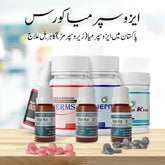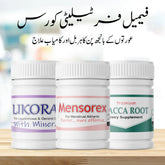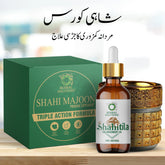Male Infertility in Pakistan: Causes, Treatments, and Natural Solutions
Understanding Male Infertility in Pakistan
Male infertility affects thousands of couples across Pakistan, yet remains a topic shrouded in misconceptions and stigma. Defined as the inability to achieve conception after one year of regular, unprotected intercourse, infertility affects approximately 15-20% of couples in Pakistan, with male factors contributing to roughly half of these cases. Despite these statistics, male infertility often receives less attention than female fertility challenges.
This comprehensive guide explores the causes, conventional treatments, and natural solutions available in Pakistan, including specialized herbal approaches that have shown promising results for many couples struggling with this challenge.
Common Causes of Male Infertility in Pakistani Men
Understanding the root causes of male infertility is essential for effective treatment. Pakistani men face several factors that may contribute to fertility challenges:
Lifestyle and Environmental Factors
- Heat exposure: Common in industries like textile manufacturing, metalwork, and construction
- Environmental toxins: Industrial pollution in urban centers like Karachi, Lahore, and Faisalabad
- Dietary deficiencies: Particularly zinc, selenium, and vitamin D
- Smoking: Significantly higher rates among Pakistani men compared to global averages
- Stress: Economic pressures and cultural expectations around family planning
Medical and Health Conditions
- Varicocele: Enlarged veins in the scrotum affecting approximately 15% of Pakistani men
- Hormonal imbalances: Including low testosterone levels
- Infections: Including tuberculosis, which remains prevalent in certain regions
- Ejaculation issues: Both structural and psychological in origin
- Genetic factors: Particularly chromosomal abnormalities and Y-chromosome microdeletions
Cultural Challenges
One unique aspect of male infertility in Pakistan is the cultural context in which it occurs:
- Strong emphasis on having children soon after marriage
- Stigma associated with fertility problems, particularly for men
- Limited awareness about male-factor infertility
- Hesitancy to seek timely medical intervention due to social concerns
Conventional Treatment Options in Pakistan
Pakistan offers several medical approaches to male infertility, though availability varies significantly between urban and rural areas:
Diagnostic Procedures
Before treatment begins, proper diagnosis is essential:
- Semen analysis: Available at major hospitals and fertility clinics in urban centers
- Hormonal testing: Measuring testosterone, FSH, LH, and prolactin levels
- Genetic testing: Limited availability, primarily in Karachi, Lahore, and Islamabad
- Ultrasound: To detect structural abnormalities like varicocele
Medical Interventions
- Surgical procedures: Including varicocele repair and vasectomy reversal
- Hormone therapy: To address imbalances affecting sperm production
- Medication: For specific conditions like infections or ejaculation problems
- Assisted reproductive technologies: Including IUI, IVF, and ICSI
Challenges in Conventional Treatment
Despite these options, Pakistani couples face significant challenges:
- Cost barriers: Most fertility treatments are not covered by insurance
- Geographic limitations: Specialized care concentrated in major cities
- Variable quality: Inconsistent standards across facilities
- Waiting times: Often extending months for specialized procedures
Traditional and Natural Approaches to Male Fertility
Given the challenges of conventional treatment, many Pakistani couples explore traditional and natural approaches to fertility enhancement:
Tibb-e-Unani and Traditional Medicine
Pakistan has a rich heritage of traditional medicine that addresses male fertility:
- Herbal formulations: Combining multiple herbs with reported benefits for reproductive health
- Dietary recommendations: Specific foods believed to enhance male virility
- Lifestyle modifications: Including sleep patterns and activity levels
Nutritional Interventions
Research supports several nutritional approaches to improving male fertility:
- Antioxidant-rich foods: Pomegranates, grapes, and berries
- Zinc-rich foods: Particularly important for sperm health
- Healthy fats: Including those found in fish, nuts, and olive oil
- Vitamin D: Especially relevant given deficiency rates in Pakistan
The Special Fertility Course: A Comprehensive Natural Solution
Among the various natural approaches available in Pakistan, the Special Fertility Course offers a unique, comprehensive program specifically designed to address male fertility challenges through traditional wisdom combined with modern understanding.
What Makes This Course Unique
The Special Fertility Course takes a holistic approach to male fertility enhancement:
- Customized herbal formulations: Tailored to address specific fertility challenges
- Complete treatment protocol: Beyond just supplements, providing comprehensive guidance
- Natural ingredients: Carefully sourced herbs with traditional use for reproductive health
- Multi-system approach: Addressing hormonal balance, stress reduction, and nutritional support
Key Components of the Special Fertility Course
This comprehensive program includes:
- Specialized herbal supplements: Formulated to support sperm production, motility, and morphology
- Nutritional guidance: Specific dietary recommendations to complement the herbal treatment
- Lifestyle modifications: Science-backed changes to daily habits that impact fertility
- Stress management techniques: Addressing the psychological factors affecting fertility
Benefits Reported by Users
Pakistani couples who have used the Special Fertility Course often report:
- Improved sperm parameters in follow-up testing
- Enhanced overall energy and vitality
- Better hormonal balance with fewer symptoms of imbalance
- Increased sense of well-being and reduced stress
- Successful conception after previous challenges
How to Incorporate It Into Your Fertility Journey
For optimal results with the Special Fertility Course:
- Begin with a proper medical evaluation to understand your specific fertility challenges
- Follow the complete program as directed rather than using components selectively
- Maintain consistent use for the recommended duration (typically 3-6 months)
- Combine with the recommended lifestyle and dietary changes
- Keep your healthcare provider informed about all supplements you're taking
Creating a Comprehensive Fertility Plan
For Pakistani couples facing male fertility challenges, a multi-faceted approach often yields the best results:
Step 1: Proper Evaluation
- Complete medical assessment to identify specific challenges
- Comprehensive semen analysis as a baseline measurement
- Evaluation of lifestyle factors that may be contributing to fertility issues
Step 2: Address Modifiable Factors
- Dietary improvements: Increasing fertility-supporting nutrients
- Activity optimization: Regular moderate exercise without overheating
- Heat exposure reduction: Including avoiding tight clothing and hot baths
- Stress management: Implementing daily relaxation practices
Step 3: Consider Combined Approaches
Many couples find success with a combination of:
- Appropriate medical interventions for specific conditions
- Natural supplements like those in the Special Fertility Course
- Lifestyle modifications that support overall reproductive health
- Psychological support to manage the emotional aspects of fertility challenges
Success Stories from Pakistan
Many Pakistani couples have overcome male fertility challenges through comprehensive approaches:
"After two years of trying to conceive and being told my sperm count was too low, we almost gave up hope. Combining medical advice with the Special Fertility Course completely changed our journey. Our son is now six months old, and we're incredibly grateful." - Ahmad from Lahore
"The most difficult part was acknowledging that I might be the reason we couldn't have children. Once I moved past that and began a comprehensive treatment approach including the herbal course, my follow-up tests showed remarkable improvement." - Faisal from Karachi
When to Seek Additional Help
While natural approaches can be effective, certain situations warrant professional medical consultation:
- No improvement after 3-6 months of natural interventions
- Known structural issues like severe varicocele
- Genetic concerns identified through testing
- Complete absence of sperm in ejaculate (azoospermia)
- Underlying medical conditions that may impact fertility
Conclusion: A Balanced Approach to Male Fertility in Pakistan
Male infertility, while challenging, is increasingly treatable through both conventional and natural approaches available in Pakistan. By combining proper medical evaluation with evidence-based natural interventions like the Special Fertility Course, many couples find renewed hope in their fertility journey.
The key to success lies in a comprehensive approach that addresses the physical, nutritional, and psychological aspects of fertility, while remaining patient through the process. Remember that improvement in sperm parameters typically takes 2-3 months due to the sperm development cycle.
If you're struggling with fertility challenges, consider exploring the Special Fertility Course as part of a holistic treatment plan. With its comprehensive approach to male reproductive health, it has helped numerous Pakistani couples achieve their dream of parenthood.








